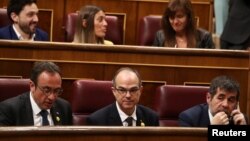Legislators representing the Catalan independence movement appear ready to help clear the way for Prime Minister Pedro Sanchez to form a new government despite the looming prospect of harsh prison sentences facing a dozen of the movement's leaders.
"People know that there will be a guilty verdict and severe punishments," said Raimond Blasi, a Barcelona city councilman for the pro- independence JuntxCat party. "But some parties are seeking to gain political spaces by negotiating with the government."
The panel of Spanish judges that presided over the trial's 52 sessions are not scheduled to deliver their verdict until September. But hopes for leniency seemed dashed hours after it concluded Thursday, when Spain's supreme court denied Catalan regional Vice President Oriol Junqueras permission to leave prison to take his seat in the recently elected European parliament.
Court officials said doing so would "complicate" Junqueras' sentencing, which could bring a prison term of up to 25 years for his role in Catalonia's failed declaration of independence in 2017.
The court also declined to lift an order for the arrest of exiled Catalan president Carles Puigdemont, who travels freely elsewhere in Europe but cannot claim his new seat in the European Parliament without first returning to Spain. He and Junqueras are challenging the ruling before the European Council and Spanish courts.
Lawyers for Puigdemont and Junqueras tried Monday to pick up the required accreditation on their clients' behalf but were denied entry into the congressional meeting room where the accreditations were being issued.
Nevertheless, Junqueras' Ezquerra Republicana de Catalunya (Catalan Republican Left, or ERC) party has announced its representatives in parliament will not vote against a second term for Sanchez, whose Socialist party holds the largest number of seats after April 28 parliamentary elections but needs help from smaller parties to secure a majority.
By abstaining on a first vote to give Sanchez a new term, the ERC could create a hung parliament and open the way to a second round of voting in which they hope deals might be struck. However Socialist party spokesmen have denied that Sanchez has negotiated anything with the ERC.
Encouraged by French President Emanuel Macron, who would like to see a centrist administration in Spain, Sanchez has reached out to the center-right Ciudadanos party in hopes of securing a majority without needing the support of more extreme or fringe parties.
But Ciudadanos leader Albert Rivera has rebuffed the appeal, saying Sanchez "will rule with the support of separatists and far leftists" as he did prior to the April elections when his negotiations with current Catalan regional President Qim Torra became a public embarrassment.
During the election campaign, conservatives accused Sanchez of secretly agreeing to pardon Catalan leaders following their trials.
The Catalan secessionists meanwhile have been extending their control over regional institutions, according to Eric Encinas, editor of the Barcelona digital publication Mediterraneo. He says Sanchez has done nothing to block the growing presence of secessionists in the police, educational system and other public services.
Encinas cites sources in Catalonia's official police union as saying the trial of Catalan security chief Joaquim Forn for his alleged role in the independence movement has not stopped the promotion of officers belonging to ERC and other nationalist parties to top positions in the force. He says the force has also obtained heavier armament in recent months with the assent of the central government.
Continuing support for the secession movement was evident during the April elections, in which only separatist parties appeared on the ballot in almost half of Catalonia's voting districts. Regional officials are refusing to address questions in Spanish at press conferences.
Aid from China
The trials also revealed that the Catalan separatists had been looking to China to finance their would-be nation.
Documents recovered from Catalonia's treasury ministry, which Spanish police searched at the time of an October 2017 independence referendum, include records showing that former Catalan president Artur Mas met with officials of the Bank of China to request a $12 billion loan to fund an independent state.
Chinese companies have been buying property in the port of Barcelona, where Chinese personnel and signs in written Chinese have become increasingly visible.
"The ERC is looking beyond Catalonia," said Blasi, who added that the party hopes to maneuver Sanchez into negotiating changes to Spain's constitution.
In a speech to supporters last year, Torra said a Catalan republic could lead the way for other regions of Spain to similarly reject the monarchy and establish a socialist confederation.




